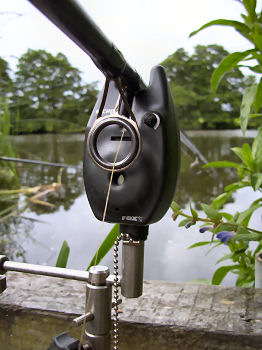All carpers use some form of indication to tell them when that fish of a lifetime picks up their bait, and most use an electronic bite alarm to confirm it. BUT; how much difference is there between an alarm that costs £5 and one which may cost over £100? Do they really make an angler more effective if they choose an expensive model? Is it just good marketing hype that tells us that to catch fish we need to spend big money….?
‘Tackle Tart’ is a term often heard in carping used to denote an angler with the latest, shiniest, most expensive kit on the market. Sometimes identified by the huge (and heavy) amount of stainless steel erected in front of them with the tiniest alarms available as they sit in a £500 tent (available in, well, green) behind perfectly aligned reel handles, on perfectly level rods, which are perfectly arranged so that the butt eyes are all in a row (looks lovely!) who walk across for ‘a bit of a social’ with the aerial of their wireless receiver blatantly visible in the top pocket of the self heating, 3 sheep woolly back camo jacket! YOU KNOW WHO YOU ARE!! However, each to their own, and I will admit to wishing I had the time and the finances to be able to afford a change from big ‘ol pit reels and old Nash rods, sitting on a slightly knackered alloy pod (the rods, not me)…….BUT I’M NOT JEALOUS! (Much….)
 But do expensive items catch more carp, and why are these things just SO expensive? I have been asked to consider bite alarms, and more importantly find out a bit about what makes them tick. What does an alarm have to have? Well, an ON/OFF switch is good, a volume control and an LED are useful, but that’s about it; – an alarm that has those features will let you know when a fish has taken your bait, so what else do you need? A cheap alarm, often available for as little as £5, mass produced in China or Korea, will have all of the above. As the line passes over a rotating wheel within the unit, magnets operate a reed switch to complete the circuit to produce a sound to alert you. Job done.
But do expensive items catch more carp, and why are these things just SO expensive? I have been asked to consider bite alarms, and more importantly find out a bit about what makes them tick. What does an alarm have to have? Well, an ON/OFF switch is good, a volume control and an LED are useful, but that’s about it; – an alarm that has those features will let you know when a fish has taken your bait, so what else do you need? A cheap alarm, often available for as little as £5, mass produced in China or Korea, will have all of the above. As the line passes over a rotating wheel within the unit, magnets operate a reed switch to complete the circuit to produce a sound to alert you. Job done.
So, what makes a £100+ alarm different? It may have a jack plug socket to attach leads to a receiver so you can turn the sound right down to avoid disturbing other anglers while you sit in the relative comfort of your bivvy. It may have a sensitivity control to stop the action of wind and waves giving false bleeps (not often used by many, but essential at certain times!) It may well be guaranteed waterproof and have extended battery life, and will almost certainly have more advanced digital electronics which make it more reliable. It will probably have a tone control to allow you to differentiate between your alarms in the event of some action, and the more expensive ones have a far nicer ‘warble’ than the cheaper ‘screamers’. Makes you sound infinitely more professional! The option of a remote receiver is something many anglers find attractive and this is something the cheaper options do not run to.
Manufacturers need to sell units, so they must produce something which appeals more than the opposition. Many alarms are marketed to be tempting to the aforementioned ‘tart’ by being shiny and compact, many are marketed by using innovations such as ‘vibration sensing’ which means the line doesn’t even have to move before any input is converted to an electrical voltage which is then displayed as visual or audible warnings, (you know the fish has picked up the bait before it does!) and many more are marketed on the reputation of the parent company. Most of the top tackle manufacturers have their own range of alarms and I’m fairly sure that this is paramount when anglers choose their alarms.
Anglers often find a brand or model which suits them and never think about changing until the unit breaks or is lost, but the question is, should we think about our alarms a bit more? Is it worth the extra money? Do we need ‘Carlos Fandango’ all singing, all dancing alarms? I think that to say ‘you get what you pay for’ has some relevance when it comes to bite indication, and if that is important, then the answer must lie with you… What do you need and what are you prepared to spend? If you want the features and build quality, then spend the money, but if you think it will catch you more fish, then I think you may be surprised!
Clint Walker
You can find a range of bite alarms for sale at
http://www.bite-alarm.co.uk/








